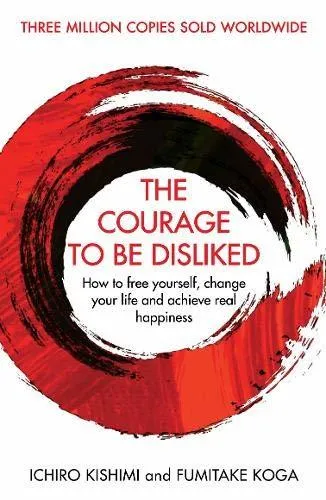The courage to be disliked
For me, it was a good introductory book into Adler’s legacy. The book is written in the form of dialogue between a youth and a philosopher.
The youth is arrogant and naive, while the philosopher is calm, wise, well-educated, and teaches the youth Adler’s approach to living a happy and meaningful life.
It was annoying at times to read because the dialogue felt superficial. If I were the youth, I would try to dig deeper and ask more questions.
That’s why I wrote “introductory,” because while the book shares a lot of Adler’s teachings, it lacks depth and practical exercises or guides.
However, it gave me a few valuable tools that I have already started to apply and see the first results:
- To be free is not to worry about being disliked and to act in your own interests.
- You are happiest when you are serving others and feel useful.
- Most mental problems stem from interpersonal relationship issues. An easy way to avoid these is to separate tasks.
- The past shapes you, but you should not be attached to it or your future. You can live in the present. You can be happy right now.
And many more. Read the book to find yours.
The courage to be disliked versus serving others
Being free and not worrying about being disliked might seem like the opposite of serving others and feeling useful, but it is not.
The courage to be disliked is required to abandon living up to others’ expectations. If you want to be liked and seek praise from others, you will find yourself losing control over your life and pleasing others.
The idea is not to rebel against that—put your interests above others, manipulate and use others. But to focus on what interests you specifically. What you want to do with your life and what you want to achieve. And the courage you need there is because often some things that you want to do, others won’t like.
Imagine you are a child who wants to learn geography at the university, but your parents are against that. It is very hard not to conform to their wishes, painfully hard. But you shall not! And that’s why you need courage to put your interests first.
Why is that not the opposite of serving others and feeling useful? Cause there are many dimensions to this. We don’t talk about using others for our interests. We talk about giving your interests a priority and serving others. And seeking praise, nor trying to be liked.
Returning to the example of the geography university, the child will feel useful to the global community by serving as a geographer, and yet their interests are counted, but they might be disliked. And yet who cares?
On separation of tasks
Think of tasks as just activities people do in their lives or emotions their experiences. We often try to have an impact on others’ people life, we want them to feel something specific or we want people to do specific things. From kids to our friends and family.
It builds a lot of expectations in us of other people. And that leads to a lot of problems.
In general, we should take care of ourselves. And others should take care of themselves unless they ask us.
We might want others to be happy, healthy, and rich. But it is not our task, it is their task. What if they don’t want it?
